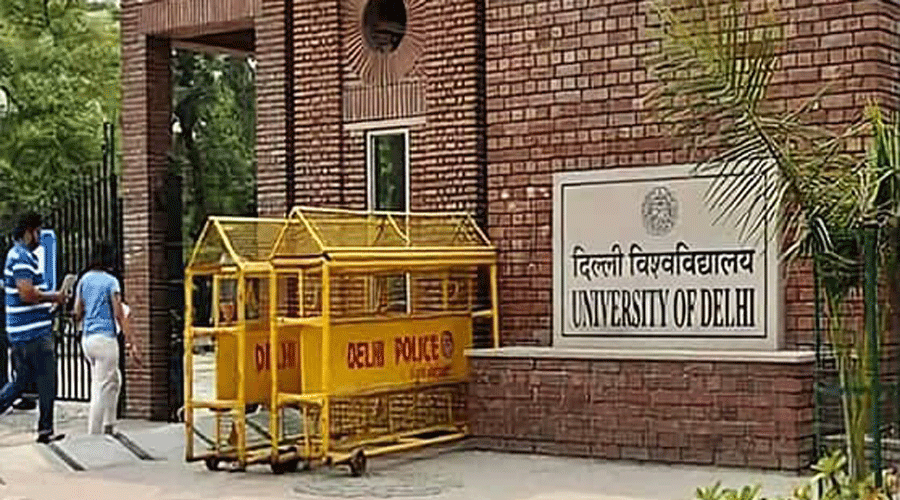The vice-chancellor of Delhi University will from now be able to modify the first-semester syllabus of undergraduate courses on his own without consulting appropriate forums like the Academic Council and the Executive Council.
The Executive Council on Thursday discussed a proposal to authorise the VC to make suitable modifications to the syllabus across semesters. But the discretionary power was limited to the first semester only after teacher representatives to the EC opposed the grant of such sweeping authority to the VC.
“We protested because syllabus framing and modification is the job of the AC and the EC. This discretionary power can be misused. Then it was decided that this power would be granted (also to the VC) for the first semester only. The decision was approved on Thursday,” an EC member said. The two councils will simultaneously retain their power of syllabus modification.
The VC is the chairperson of both the AC and the EC, which are made up of mainly teachers, principals and deans.
DU faculty forums like the Democratic Teachers’ Front (DTF) and the Academics for Actions and Development (AAD) criticised the move, saying it would be doing injustice with students who would have to pursue certain content that could likely be approved without due consultations.
The proposal was included in the agenda despite it being rejected by the AC in its meeting on August 3. The office of the VC prepares the agenda for meetings. Yogesh Singh is the current VC of Delhi University. Singh first became a VC at Maharaja Sayajirao University in Vadodara when Narendra Modi was Gujarat chief minister.
At Thursday’s meeting, the EC approved the syllabus for the first semester of various undergraduate courses under the new UG Curriculum Framework (UGCF). This will replace the existing three-year UG programme with a four-year course.
This is the first time only the first-semester syllabus has been approved at the beginning of the academic year instead of the entire curriculum.
“The students who will take admission in the UG courses this year will know about only the first semester syllabus. They will be clueless about what will be taught in subsequent semesters. Moreover, the VC will have the power to make any modification to the syllabus as he pleases. This is injustice to students. The students taking admission need to know from the beginning the flow of the entire syllabus, the sequence of papers and the assessment procedure,” said Abha Deb Habib from the DTF.
Rajesh Jha from the AAD feared that entrusting the VC with powers so far assigned to the Academic Council and the Executive Council could lead to the introduction of content aligned with the ideology of the central government. The EC has 25 members and the AC over 100, which creates a broad scope for discussions before decisions are taken and also incorporates checks and balances.
Endowment funds
The Union government has asked all central universities to set up endowment funds with management bodies comprising donors and key officials. The Delhi University EC considered the proposal on Thursday but agreed to take a decision later.
The education ministry had last month circulated among all central universities the guidelines for the Central University Endowment Fund for “necessary actions”.
According to the guidelines, central universities will mobilise donations, funds and contributions from well-wishers, alumni, philanthropists and industries for academic and infrastructure purposes. This is part of efforts to make universities generate funds from their own resources instead of banking on government cash.
The endowment fund of each university will be governed by a seven-member board comprising the VC, finance officer, two professors from different departments or streams and three prominent donors nominated by the EC for three years. The board will decide how to utilise the funds. It can open a trust or a company under Section 8 of the Companies Act to utilise the fund. A Section 8 company or trust is a not-for-profit institution.
“The idea is to facilitate the entry of private people in decision-making of public institutions. Just because they are donating, they will also be able to open a company for utilising the funds. They will use the university’s name and run the company. Nobody knows what will be their accountability to the university,” Jha said.
Fee hike
The DU Executive Committee was formally informed at Thursday’s meeting about the recent fee hike.
DU has increased the university development charge from Rs 600 to Rs 900 per student per annum. Besides, two new fee heads have been introduced.
Under the University Facility Service Charges, Rs 500 will be collected yearly from each student. Also, Rs 100 will be charged per annum under the Economically Weaker Section Support University Fund.










